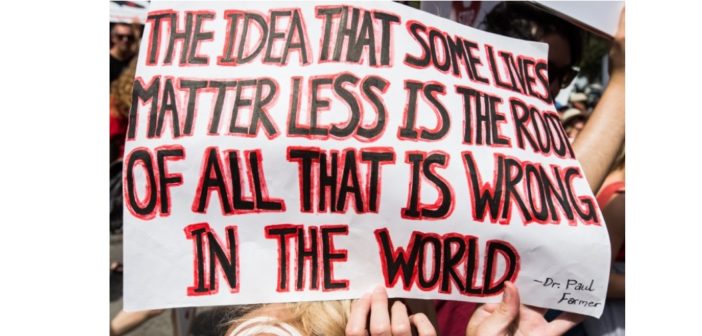There are changes happening in the veganism and animal liberation movements. Mainstream veganism, which is largely food-focused and apolitical, just isn’t cutting it, and its inattention to other forms of oppression besides speciesism (like racism, ableism, sexism, and homophobia) is a big problem. The good news is that there are a large number of activists fighting to change this and to create a movement that recognizes the interconnectedness of all forms of oppression and fights against all of them.

Z. Zane McNeill is an activist, scholar, writer, and artist whose work centers around that interconnectedness and the need for a more radical, political veganism. They co-edited the volume Queer and Trans Voices: Achieving Liberation Through Consistent Anti-Oppression, and are currently working on, among other projects, a new collection tentatively called Vegan Entanglements: Dismantling Racial and Carceral Capitalism. In an interview with Zane, we discussed the concept of consistent anti-oppression, what’s wrong with single-issue veganism, and where the vegan movement is headed.
Dylan Forest: You’ve written recently about the potential of veganism, not just as a diet, but as “a political framework that challenges us to reexamine our relationship with gender, sexuality, and power in our everyday lives.” I’d love to talk more about the idea of “political veganism.” Many people are used to thinking about veganism as a way of eating, or perhaps more expansively, as a lifestyle. What does it mean to you to instead view veganism as a political framework?
Z. Zane McNeill: As Christopher McJetters has written, “A lot of people (once again, usually white) think it’s prudent to de-politicize veganism because attaching veganism to politics makes it complicated and fussy.” De-politicizing vegan and making it a ‘plant-based diet’ actually does us a disservice, though. Vegan politics is about breaking through our cognitive dissonance and recognizing the power structures that impact us, animals, and the environment. Veganism is integral to destabilizing those systems of violence that sustain each other.
Sisters Aph and Syl Ko have written on the necessity for vegans to recognize that structures of oppression—white supremacy, speciesism, the carceral state, capitalism—are interconnected. A commitment to fighting all of these interconnected structures is what Julia Feliz has termed “consistent anti-oppression.” Vegan politics are at the intersections of battles for worker’s rights, environmental justice, food sovereignty, restorative justice, and queer liberation.
As Syl Ko has written, “a serious commitment to anti-racism will involve a deep commitment to animals.” Similarly, to be vegan, to do vegan politics, you must be anti-racist. Otherwise, you are upholding, sustaining, and perpetuating systems of white supremacy, which also are inherently speciesist and promote the oppression of non-humans, as well.
In contrast to the type of political veganism you’re advocating for, I’ve seen plenty of veganism that could be called apolitical. Typically what I’m referencing is very food and consumer focused, and doesn’t concern itself with larger systems of power. Do you think there’s any harm in this kind of veganism?
Very much so. There has been a tendency for animal welfare organizations to promote a ‘vote with your dollar’ model of so-called activism. This assimilationist technique unfortunately does nothing more than humane-wash the violence of the capitalist system. As McJetters has explained, “…if we do not curate our movement, capitalism is going to swoop in and pretend to save the day when it was capitalism that got us looking fucked up in the first goddamn place. Capitalism will only find different ways to exploit them and us. It is neither revolutionary nor radical.” This ‘consumer boycott’ and/or ‘diet fad’ method is not veganism, it is a plant-based diet. If we sanitize, depoliticize, and whitewash what it means to be vegan and do vegan politics, we are doing harm towards animals. We cannot fight for the liberation of non-humans without being anti-capitalist.
You co-edited Queer and Trans Voices: Achieving Liberation Through Consistent Anti-Oppression, a volume that came out earlier this year. What was the aim of this project?
At my heart, I am an activist historian who values archiving and uplifting marginalized voices. I approached Julia Feliz of Sanctuary Publishers about wanting to do a collection where folks could explore the connections between their LGBTQIA+ and vegan identities, the intersections between speciesism and cisheteropatriarchy, and the importance of fighting for animal liberation in addition to our own queer liberation. I am so humbled that I was able to facilitate conversations about these power structures and offer a platform for historically silenced folks to speak about their identities.
How has your queer identity informed your vegan activism?
So, for me personally it was actually the other way around. I have been doing vegan politics since I was 11 and came to other liberation movements through my animal activism. During this journey, I also found labels—such as genderfluidflex/nonbinary/genderfluid/genderqueer/trans—that not only helped me understand who I was, but also how colonial conceptions of gender are integrally connected to speciesism and other structures of violence. It was my veganism that allowed me to challenge my internalized transphobia and explore genders and sexualities that have historically been considered deviant/immoral and punishable/criminal.
A commitment to consistent anti-oppression seems to be foundational to your activism. Can you explain what consistent anti-oppression means to you and why it’s important?
As I mentioned earlier, consistent anti-oppression is a term coined by Julia Feliz. It is a concept that simply means that in order to challenge any form of oppression—racism, transphobia, speciesism—you need to fight against all forms of oppression, because they are so fundamentally linked. To be a ‘single-issue vegan,’ you are actually fitting into and perpetuating a “speciesist supremacist hierarchy” as Feliz explains in Queer and Trans Voices.
Have you encountered resistance from non-vegan social justice activists who object to including animals in their anti-oppression framework? For example, I’ve heard the sentiment that caring about animals should take the backseat when so many humans are suffering so much, which is obviously an example of speciesism. Have you encountered this, and how do you respond if so?
This is another reason I wanted to publish the collection Queer and Trans Voices. It had two audiences: 1. Single-issue vegans and 2. Non-vegan social justice activists. I often say that growing up in West Virginia, I was bullied more for being vegan than being queer, which I think a lot of people are surprised about. To this day, I’m pretty involved in the queer Appalachian community, as well as other leftist Appalachian activist circles.
Unfortunately, vegans and veganism in these groups are usually either the brunt of a joke or seen as inherently racist, ableist, etc. As I’ve written before, leftists need to include animals in their fights for collective liberation. We cannot dismantle violent systems like capitalism or white supremacy, without also fighting against speciesism.
I’ve also seen sort of the reverse issue, where vegans or animal rights activists are resistant or even hostile towards the idea of including human-centered social justice issues in their activism. This can sometimes be in the form of the insistence that we need to focus on the animals. I’ve seen this called “single-issue veganism.” Ignoring for a moment whether it’s right to ignore these other issues, is this even effective? Is animal liberation possible in isolation from other forms of liberation?
So, I wrote about this a bit above, so I would like to instead add some optimism about the contemporary vegan movement. Until very recently, the mainstream vegan movement was hesitant to move beyond single-issue activism. This been critiqued for many years, especially by Black Brown Indigenous People of Color (BBIPOC) who have been doing the consistent anti-oppression work forever. As activist LoriKim Alexander has written in Queer and Trans Voices, “We, Trans, Nonbinary, and Queer Black and Brown people have been here. We’ve been here in all movement spaces and in all the creations of movement philosophies.” White vegans are finally starting to recognize that animal liberation cannot happen without engaging in consistent anti-oppression work. Sinergia Animal, an international animal protection organization, is currently organizing an alliance of animal rights activists and organizations that are committed to activism that focuses on dismantling all hegemonic power structures. Other groups, like Encompass, Chilis on Wheels, Collectively Free, VINE Sanctuary, and Food and Water Watch are also doing great intersectional work.
Speaking of another kind of isolation, many of us are currently in quarantine due to the COVID-19 pandemic. Has this affected your activism? Do you have any thoughts for people who are struggling to feel connected to activism while in lockdown?
Most of my current work is archival now, instead of grassroots organizing, so COVID-19 hasn’t physically brought my work to a halt. However, the isolation and precarity I have felt since quarantine began is harrowing and has made it more difficult to write. I’m currently working on other collections as well, on everything from socially engaged art and choreopolitics to queer ecologies and queerness in Appalachia, and a few contributors have had to drop out because of the challenges we are currently facing.
In addition to COVID-19, the continuing murders of BBIPOC by the police has effected many of us—especially BBIPOC who have to do the work that white people won’t while dealing with the trauma and violence perpetuated by the police state. One of my friends and colleagues, a Black trans femme, was shot with a rubber bullet by the police in California. We’ve previously written on queer of color critique and Black trans protest as a form of choreopolitics together. They were targeted and shot by the police State that I have the privilege of criticizing and writing with them about, while also never being touched by it. The police State that shot them protects my whiteness and is sustained by it. Recognizing that I build up structures of white supremacy that target Black trans femmes like my friend is difficult to come to terms with. Right now, all of us white folks need to reckon with the systems that be uphold, whether or not we consider ourselves ‘racist.’ White vegans especially need to do this.
Read Black authors—especially Black and trans BBIPOC. $ubscribe and $upport their work. Give your platforms to these folks—we have social and financial capital that we can use to uplift these marginalized voices. To be anti-racist you need to be a race traitor and actively fight against the systems that we, white people, benefit from, which actively oppresses BBIPOC. Work through Me and White Supremacy, by Layla Saad. Join vegan Julia Feliz’s Carm’s Anti-Racism Classroom. To fight for animals, we need to challenge white supremacy within ourselves first.
Featured image: a protester at Melbourne’s March to Close All Slaughterhouses holds a sign that reads: “The idea that some lives matter less is the root of all that is wrong in the world” – Dr. Paul Farmer. Image credit Jo-Anne McArthur / We Animals.





